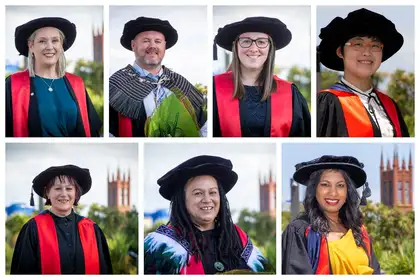
From top left: Stephanie Denne, Jeremy Hapeta, Katie Knapp, Naren Naren. From bottom left: Annette O’Sullivan, Paulé Ruwhiu, Kasuni Weeransinghe.
Ten staff were among the record 59 graduates to receive doctoral degrees at the three November graduation ceremonies in Palmerston North last Friday.
Stephanie Denne
Dr Denne, a lecturer in the School of Psychology, analysed accounts of violence at sites of domestic violence intervention, interrogating the ways men are ‘held to account’ for their violence within a Eurocentric and neoliberal knowledge economy. She found that targeted individualistic interventions reproduced fixed and inflexible identity categories of difference that were complicit with multiple and intersecting sociocultural conditions which enable violence against women and children.
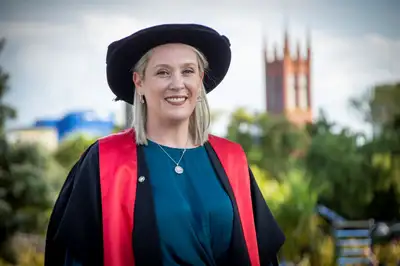
Dr Stephanie Denne
Dr Denne says despite New Zealand’s history of progressive domestic violence legislation and policy,
the country’s increasingly institutionalised systems of response are struggling to reduce the alarmingly high rates of domestic violence in our communities. Therefore, how we currently understand and respond to domestic violence needs to change.
She advocates for a transformation in narratives of accountability, where the development of collaborative community partnerships can open reflexive spaces for ethical.
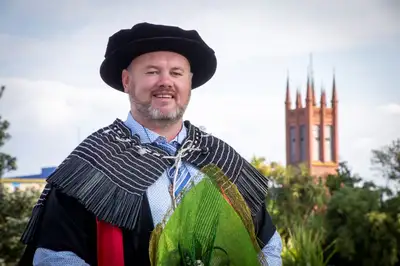
Dr Jeremy Hapeta.
Dr Jeremy Hapeta
Lecturer in Physical Education in the School of Sport, Exercise and Nutrition, Dr Hapeta examined four inter-related case studies of how Māori culture was included within New Zealand rugby. His research utilised kaupapa Māori methodologies to scrutinise the past academic literature and marketing campaigns, present teams/programmes, and how these had impacted upon the wellbeing outcomes for those involved such as participants (players, coaches and administrators) and Māori.
The results from the cases studied concluded that respectful inclusion of Māori culture in rugby-related environments can provide spaces for enhanced wellbeing and encouraged a spirit of cultural inclusion. However, the research also suggested that when deciding whether to include elements of Māori culture into marketing or sport teams and programmes, the impact on Māori wellbeing should always be paramount.
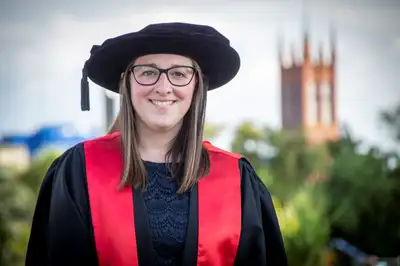
Dr Katie Knapp.
Dr Katie Knapp
Dr Knapp, a lecturer in the School of Psychology, explored the relationship between working memory capacity and task-switching to identify potential reasons for their lack of association. The results revealed that these tasks are related when more sensitive measures of task-switching are utilised.
These findings have important theoretical implications, suggesting that both tasks do measure attentional control. In addition, the findings highlight methodological challenges involved in using the task switching paradigm to index attentional control abilities.
Tasks used to measure working memory capacity and task switching are both thought to assess attentional control abilities. Given that they are purported to measure the same underlying cognitive construct, one would expect performance on these tasks to be related. However, preliminary research has failed to find such an association. These perplexing findings have important implications for theories of both task switching and working memory capacity, making it imperative to examine this relationship in more detail.
Dr Monica Koia
Research Coordinator in the office of the Deputy Vice-Chancellor Māori, Dr Koia examined the development and implementation of Māori cancer navigator’ roles, and the contribution these roles make to the patient/whānau cancer journey.
Using a kaupapa Māori methodology, the findings showed navigators are the only roles that provide continuous supportive care to patients/whanau throughout their entire cancer journey, ensuring they gain timely access to cancer care services.
Dr Koa argues that greater integration of Māori cancer navigators within cancer services will help address fragmentation in care and improve communication between health professionals themselves as well as with patients/whānau.
Dr Diane Muller
Dr Muller, a Research Officer in the Sleep/Wake Research Centre, conducted a mixed methods study within the Moe Kura: Mother and Child, Sleep and Wellbeing in Aotearoa/New Zealand research programme.
She says ethnic and socioeconomic inequities exist in adult sleep in New Zealand, but little is known about the social patterning of children’s sleep.
Kaupapa Māori research principles, social determinants of health and socioecological theoretical lenses informed the study. Dr Muller investigated associations between ethnicity, socioeconomic position and sleep of 340 Māori and 570 non-Maori pre-schoolers using log-binomial regression models.
In addition, she interviewed 15 Māori and 16 non-Māori mothers from low and high socio-economic position and analysed data using thematic analysis.
Dr Muller’s findings revealed that ethnic and socio-economic inequities exist in pre-schoolers’ sleep health and social determinants of children’s sleep included institutional racism, material and financial resources, employment, housing, social support, early childhood education and health services. She says action is required to address the socio-political drivers of pre-schooler sleep inequities.
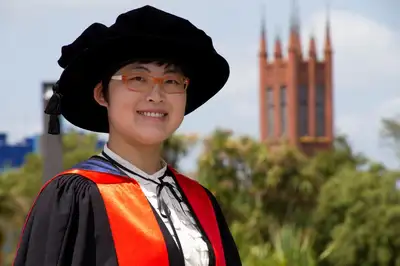
Dr Naren Naren.
Dr Naren Naren
A research technician in the School of Natural and Computational Sciences, Dr Naren established the overall regulatory network for histidine utilisation in a plant growth-promoting bacterium Pseudomonas fluorescens. She articulated how carbon and nitrogen metabolisms are coordinated in the case of histidine utilisation to maximise bacterial fitness in nutrient-complex environments. Her research has integrated the current understanding of carbon regulation into the cellular nitrogen metabolism of bacteria.
As an amino acid, histidine is a good nutrient source for many bacteria. However, its use poses a significant challenge as it produces excess nitrogen over carbon. Carbon and nitrogen are two of the most important building blocks of all living organisms. It is crucial to coordinate cellular carbon and nitrogen metabolisms. Thus, the rate of histidine utilisation must be carefully regulated to maintain the cellular carbon/nitrogen balance.
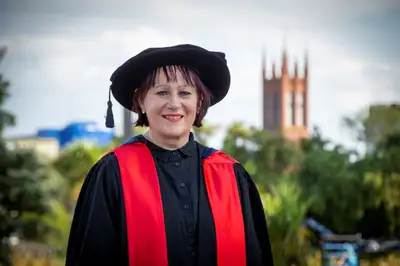
Dr Annette O’Sullivan.
Dr Annette O’Sullivan
Senior lecturer in the School of Design, Dr O’Sullivan selected historic sheep stations as sites for a material culture study of objects and their transformations over time. Through a framework of life stages of a designed object she constructed a colonial history of wool bale stencilling, a vernacular lettering history, histories of brand identity on New Zealand sheep stations, and a design history of visual identity derived from wool bale stencils, which have had a ubiquitous presence in New Zealand culture for more than 150 years.
They were the first export brands to represent the country, they became the visual identity in branding sheep stations and have been used in contemporary New Zealand design. Despite this, there has been little published on their history, use, meaning or significance in New Zealand culture.
The results confirmed the contribution of wool bale stencils as significant items of rural cultural heritage and preserves the memory of a disappearing history.
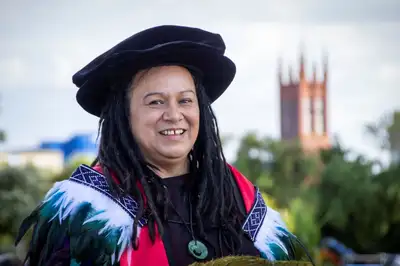
Dr Paulé Ruwhiu.
Dr Paulé Ruwhiu
Dr Ruwhiu, a lecturer in the School of Social Work, explored the process of decolonisation and the experiences of the participants engaged in social work and social work education. It challenged three key areas of participation; education, practice and policy to ensure they were aligned and working in unison.
This study embraced a kaupapa Māori methodology and was a qualitative approach to three diverse groups in social work; Māori social work educators, Māori social workers and Māori social work students.
Decolonisation is a process that connects the past, present and future allowing the participant time to learn about their own historical truths in a facilitated and safe environment. Knowing who you are and where you come from is central to social work education.

Dr Kasuni Weeransinghe.
Dr Kasuni Weeransinghe
An assistant lecturer in the School of Management, Dr Weerasinghe studied policy makers, planners, funders, implementers and clinicians across the New Zealand healthcare sector to understand their views on the use of big data and related technologies in health.
She found there was a shared understanding of the importance of data quality, the increasing challenges of privacy and security, and the importance of new types of data in measuring health outcomes. However, misalignment was observed in differing definitions of big data, as well as perceptions around data ownership, data sharing, use of patient-generated data and interoperability.
Dr Catherine Whitehouse
Dr Whitehouse, a professional clinician in the School of Psychology, investigated the relationship between emotional loneliness, social loneliness, social isolation, and cognition in adults 65 years and over. She found that emotional loneliness, but not social loneliness or social isolation, was associated with poorer cognition.
Older adults who were emotionally lonely but not socially isolated had poorer cognitive performance than those who were emotionally lonely and socially isolated.
Dr Whitehouse says the results highlight the need to assess older adults for loneliness and social isolation and the importance of close confidants for the older adult.